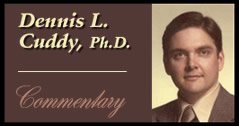Other
Cuddy
Articles:
Sept. 11:
Hold Government
Accountable
An
Economic Assault on
African-Americans and Others in The US
IT MIGHT JUST AS WELL BE SEPT. 10, 2001
By
Dennis L. Cuddy, Ph.D.
August 5, 2004
NewsWithViews.com
THE SEPT. 11 Commission recently released its final report, which unfortunately didn't indicate that the terrorist attacks were easily preventable.
As the author of two books on the 9/11 attacks, my only semi-facetious question still is, "Who didn't know the attacks were coming?" On June 23, 2001, Reuters released a story that even appeared on AirlineBiz.com revealing that Osama bin Laden was in a race to attack the U.S.
And in July 2001, even on the Northwest Airlines flight attendants' Web site, there was a story of a terrorist plot to hijack airliners and crash them into the World Trade Center and Pentagon! How much more do you want? Even the infamous Aug. 6, 2001, Presidential Daily Briefing was titled "Bin Laden Determined to Attack in the U.S."
Here's what common sense should have told the Bush administration. If an attack in the U.S. was possible, contingency planning was necessary. Where might terrorists strike? The World Trade Center, which they already attacked in 1993, was a likely target. What if there was a truck bomb, or sarin gas or an air attack? The fact that no one knew hijacked airliners would be used as missiles is irrelevant.
An attack by hijacked airliners, or private jet packed with explosives or a small plane or helicopter easily could have been prevented by having an Apache Longbow copter (with 30mm chain gun, rockets and missiles) on alert at a nearby military installation.
This isn't just about the attacks of 9/11, but about the future as well, as we well know by this week's latest terror news.
According to a report released by the Sept. 11 Commission staff just before the final hearings, al Qaeda is actively trying to replicate the destruction of 9/11. And under questioning on June 16, top FBI counterterrorism official John Pistole informed the commission that al Qaeda operatives interested in aviation attacks are still at large in the U.S.
The staff report stated: "The trend toward attacks intended to cause ever-higher casualties will continue." "Ever-higher casualties" than the 3,000 killed on Sept. 11, 2001?
Sept. 11, 2004, is a Saturday. Has anyone asked if there is a plan to prevent an air attack, for example, on any of Philadelphia's football stadiums filled with tens of thousands of people on that or any other day? Has anyone asked if there is a plan to prevent terrorists from derailing passenger trains, setting forest or house fires, tampering with food, blowing up gas lines or large dams, and many, many other methods of attack?
In an effort to find out if there were any warnings relevant to the attacks of Sept. 11, 2001, I filed a Freedom of Information request with the federal government. The Department of Homeland Security replied that they found 12 relevant "Information Circulars" of 35 pages, but they would not let me see them.
Did the Sept. 11 Commission see them? The Department of Homeland Security wrote to me denying that the FAA had issued an "emergency ruling" on Sept. 3, 2001, related to a possible terrorist attack.
But James Doran of the London Times just told me he is sticking by his claim in that newspaper that such an "emergency ruling" had indeed been issued.
The Department of Homeland Security also wrote to me denying that any warning was issued on Sept. 10, 2001. But then who called San Francisco Mayor Willie Brown late that night warning him and all Americans about air travel?
The commission hasn't told us yet, just as they haven't told us who the top Pentagon officials were who on Sept. 10, 2001, suddenly canceled their travel plans for the morning of Sept. 11, apparently because of security concerns.
The final commission report didn't answer these questions - and the American people therefore should consider themselves still greatly at risk.
This article First appeared in the Philadelphia Daily News 8-4-04
� 2004 Dennis Cuddy - All Rights Reserved
Order Dennis Cuddy's new book "Cover-Up: Government Spin or Truth?"
Sign Up For Free E-Mail Alerts
E-Mails are used strictly for NWVs alerts, not for sale
Dennis Laurence Cuddy, historian and political analyst, received a Ph.D. from the University of North Carolina at Chapel Hill (major in American History, minor in political science). Dr. Cuddy has taught at the university level, has been a political and economic risk analyst for an international consulting firm, and has been a Senior Associate with the U.S. Department of Education.
Cuddy has also testified before members of Congress
on behalf of the U.S. Department of Justice. Dr. Cuddy has authored or
edited seventeen books and booklets, and has written hundreds of articles
appearing in newspapers around the nation, including The Washington Post,
Los Angeles Times and USA Today. He has been a guest on numerous radio
talk shows in various parts of the country, such as ABC Radio in New York
City, and he has also been a guest on the national television programs
USA Today and CBS's Nightwatch.
Here's what common sense should
have told the Bush administration. If an attack in the U.S. was possible,
contingency planning was necessary. Where might terrorists strike? The
World Trade Center, which they already attacked in 1993, was a likely
target.








